Situated on the southern slopes of Mount Abantos, San Lorenzo de El Escorial is a quaint town located about 50 km from Madrid. The town is best known for its palace, today known as the Royal Site of San Lorenzo de El Escorial or Monasterio del Escorial. A popular tourist destination, the palace is open to visitors who can explore the royal apartments, the royal chapel, and the art gallery.
The town of San Lorenzo de El Escorial is also home to several other historical buildings, including monasteries and churches. In addition, the town is surrounded by breathtaking scenery, making it an ideal place to go for a hike or a picnic.
Whether you're interested in history or nature, San Lorenzo de El Escorial is the perfect catch.
El Escorial - In a Nutshell
Opening Hours
Open from Tuesday to Sunday 10am - 6pm (October to March) and from 10am - 7pm (April to September)
Know before you go
Best time to visit: September to November
Starting Prices for El Escorial Tickets at €12.
Suggested duration: Ideally, you will take 3 - 4 hours to cover all the areas.
Location: Madrid
Address
Madrid, Plaza de España, 1, 28200 El Escorial, Spain
Get there
Which El Escorial ticket should you buy?
Depending on whether you're a history lover, nature enthusiast or architecture admirer, your itinerary may vary. Hence it is important to plan ahead, skip the lines and book the best experience. Moreover, El Escorial is a popular tourist spot, so we highly recommend booking the fast track tickets to save time and dime.
You may choose to book one of Headout's pre-planned tours , crafted combining the best experiences including the El Escorial in a package or book your El Escorial tickets individually on the Headout app for just €12.
Children under 5 years of age can enter free. Citizens between 5 and 16 years of age, over 65 years of age and accredited students up to 25 years of age with updated proof can avail reduced rates.
What makes El Escorial special?
Known as the largest Renaissance building in the world, the UNESCO World Heritage site is a monastery located in the town of San Lorenzo de El Escorial in Spain. It is one of the most important historical sites in Europe and is the largest monastery in all of Spain. El Escorial was built during the reign of King Philip II of Spain as a monastery and royal palace. Built in the Herrerian style, this fascinating place now serves as a popular tourist attraction.
The complex consists of numerous buildings, including a basilica, a royal palace, a monastery, a library, and a museum. The most famous feature of El Escorial is the Royal Chapel, which contains the tombs of King Philip II and his family. Other notable features include the frescoes by Pellegrino Tibaldi and the paintings by Titian, Tintoretto, and Veronese. All the structures are well preserved and provide a glimpse into Spanish history.
Plan your visit
Best time to visit El Escorial
Autumn, from September to November is the best time to visit El Escorial considering the pleasant weather, and lesser crowds unlike in Summer, when the palace is flocked.
El Escorial Opening Hours
From October to March : Open from Tuesday to Sunday: 10am - 6pm
From April to September: Open from Tuesday to Sunday: 10am - 7pm
Admission to the Monastery and box office closes one hour earlier.
The Palace is closed on all Mondays and the following dates:
Jan 1, Jan 6, May 1, Sep 12, Dec 24, Dec 25, Dec 31.
Getting to El Escorial
By Bus
Easiest way is to take bus route 664
Otherwise, tou can take the metro via Line 3 or Line 6 to Moncloa station.
Bus 661 runs from Moncloa bus station to El Escorial, which departs every 15 to 30 minutes during weekdays. Stop at Estación de Autobuses San Lorenzo de El Escorial (the last stop), from where a 10 minute walk will take you to the monastery.
By Car
The direct route from Madrid is via the A-6/AP-6 autopista, or freeway. The M-503/M-600 can be the alternative route.
Consider checking the cost of the toll roads before hand, in case you cross them in your route.
By Train
From Madrid, you can take the train from the following stations in the C3 regional line:
Atocha, Chamartin, Nuevos Ministerios, or Recoletos stations.
The ride takes about an hour and you will have a 10-15 minute walk to El Escorial from the train station.
One way ticket costs about €8.
History behind the Palace
Spain's El Escorial is a royal palace and monastery complex near Madrid that was commissioned by King Phillip II in 1563. It was built to commemorate the Spanish victory over the French in the 1557 battle of St Quentin in Picardy. King Phillip II wanted to create a Necropolis (a cemetery) for his dead parents and upcoming descendants, which has been followed by most Spanish kings who have been buried at La Escorial.
It was designed by Juan Bautista de Toledo, a prominent Renaissance architect who had spent much time in Italy but who sadly did not live to see the completion of the project. Juan de Herrera, took up the project and completed it after Toledo’s death in 1567.Construction began in 1563 and was completed in 1584.The complex took 21 years to complete and today houses the remains of most of Spain's kings as well as a museum, library, and art gallery. Visitors can appreciate the building's architecture as well as its historical significance.
The building is notable for its grid-mark layout which some claim was designed as an homage to Saint Lawrence, the patron saint of Spain. The building is considered to be one of the finest examples of Renaissance architecture. El Escorial was declared a UNESCO World Heritage Site in 1984.
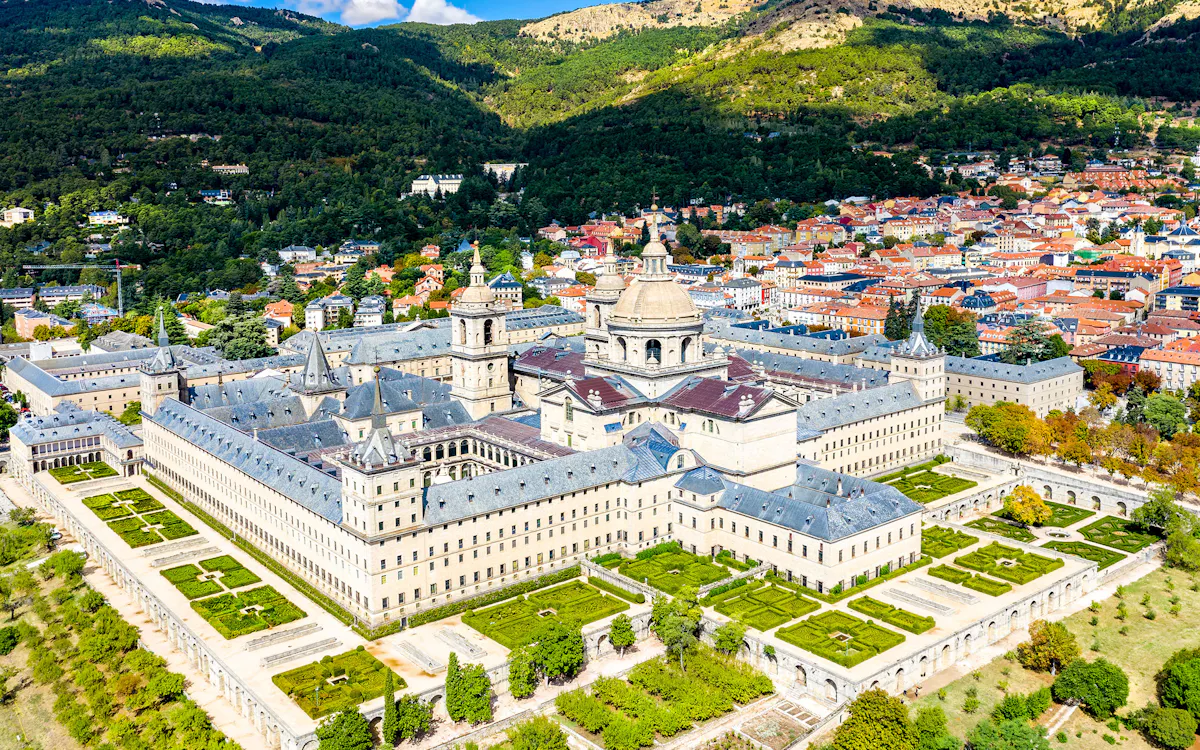
Top 5 things to see at El Escorial
1The Hall of Battles
The Hall of Battles at El Escorial is one of the largest and most impressive rooms in the palace. Built by King Philip II to commemorate his military victories, the hall is decorated with a series of massive paintings that depict scenes from famous battles. The paintings are accompanied by inscriptions that detail the events that took place. Each painting tells a story of heroism and sacrifice, and together they provide a fascinating glimpse into the history of warfare. The Hall of Battles is an impressive testimony to the power and glory of the Spanish Empire.
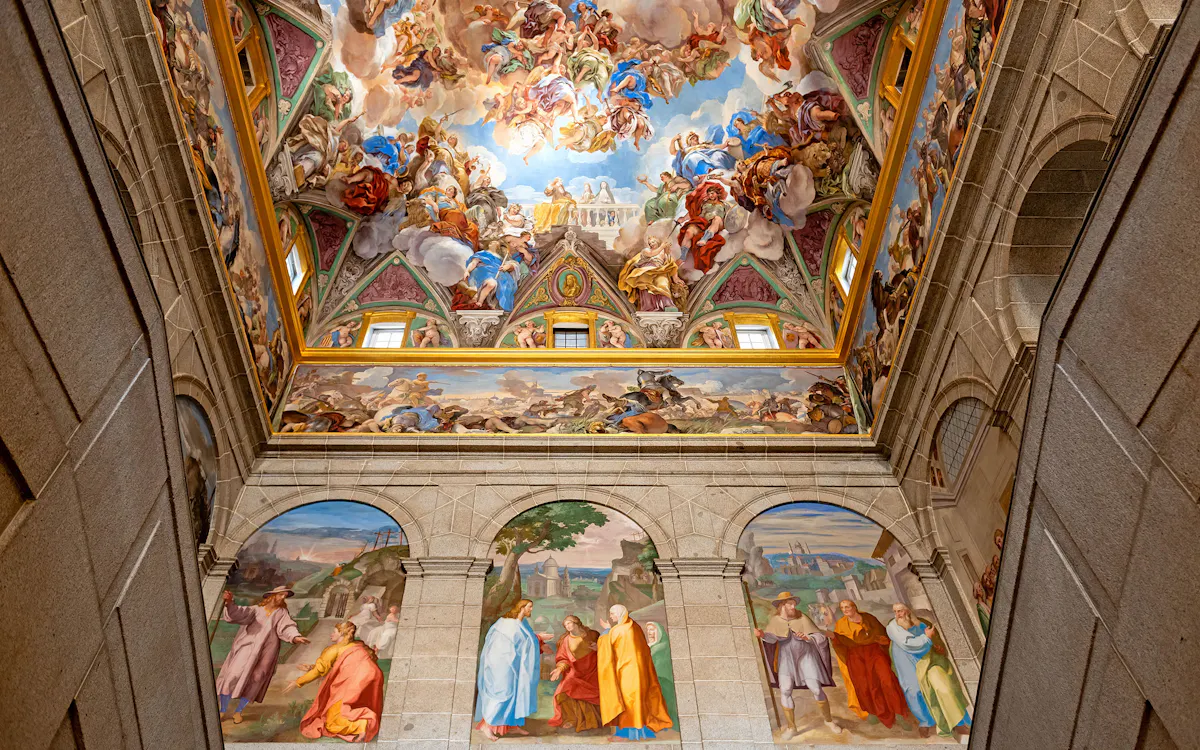
2The Royal Library
The Royal Library of El Escorial is one of the largest and most important libraries in Spain. It was founded in 1561 by King Philip II, and contains over 45,000 books and manuscripts. The library is open to the public, and is particularly popular with students and scholars. Visitors can explore the three main floors of the library, which contain a variety of Baroque artworks and architectural features. The library also houses a number of rare and valuable books, including a first edition of Don Quixote and a signed copy of Columbus’s travel diary. With its rich history and impressive collections, the Royal Library of El Escorial is a must-see for anyone interested in Spanish culture.
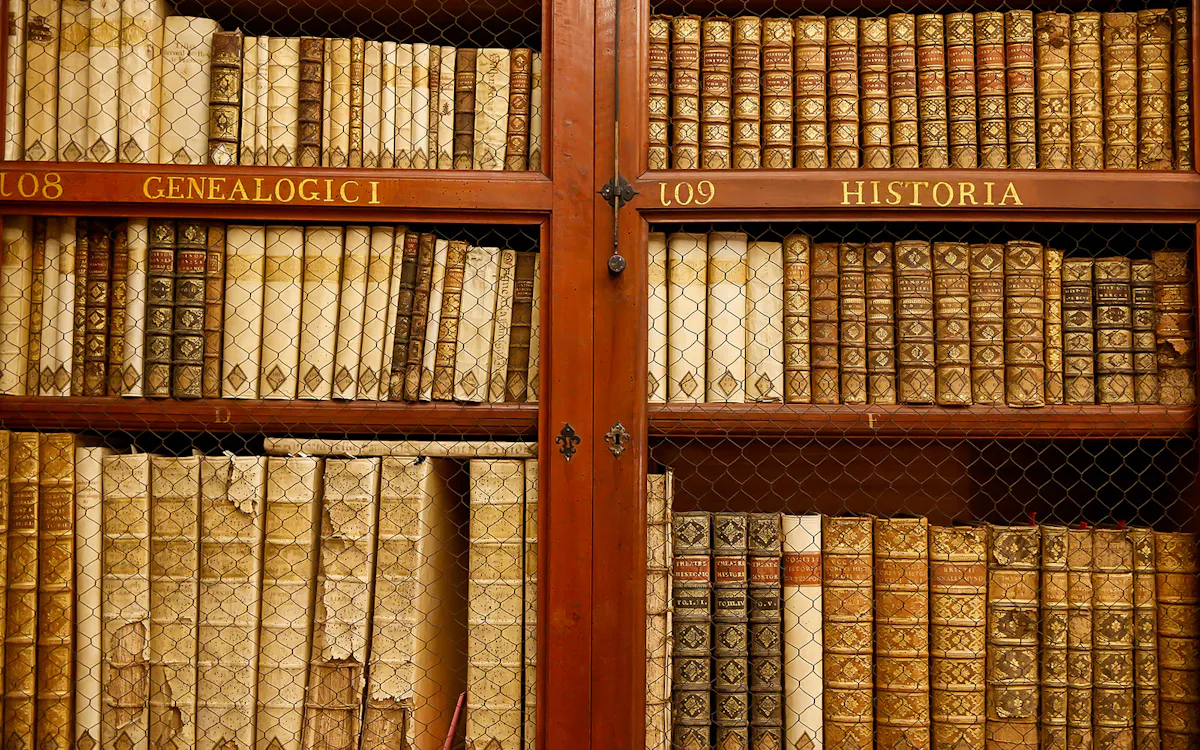
3The Royal Pantheon
The Royal Pantheon of the Escorial is a mausoleum located in El Escorial. The pantheon was built to house the remains of the Spanish royal family. It is a large, octagonal building with a domed roof. The interior of the pantheon is decorated with marble and includes a number of tombs. The most notable tomb is that of King Philip II, who was the ruler of Spain during its golden age. The pantheon also contains the remains of other members of the royal family, including Queen Isabela and King Charles V.
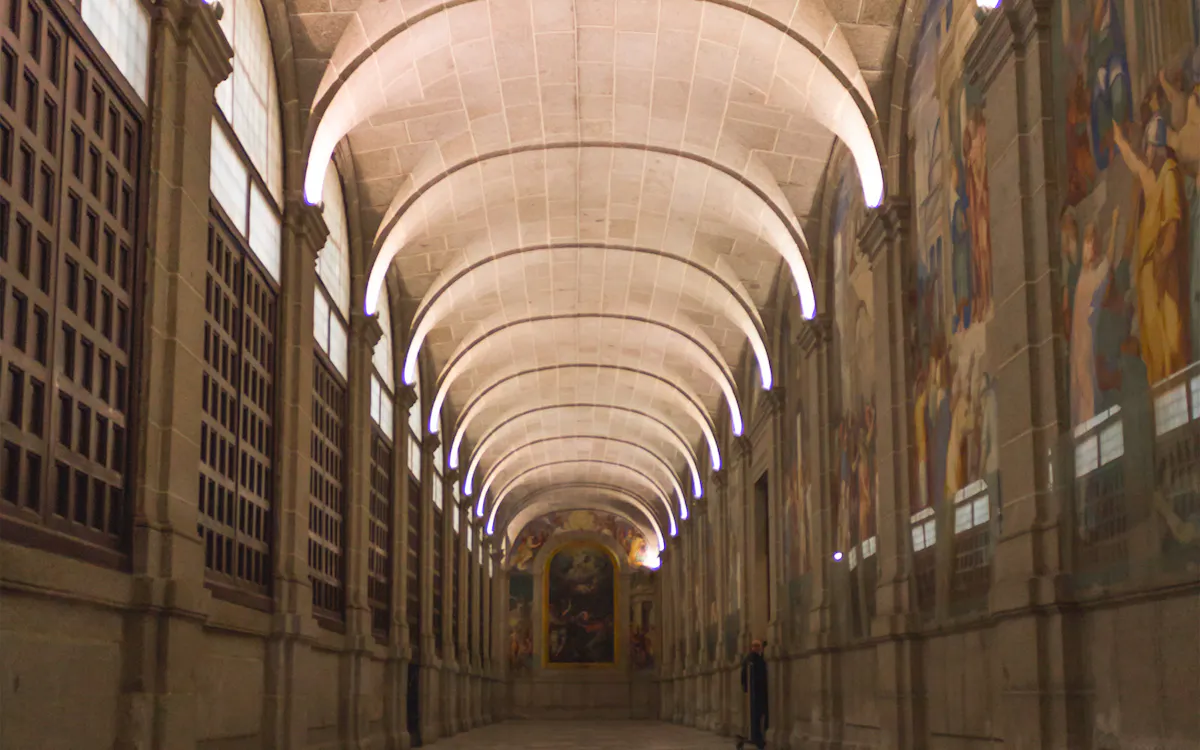
4The Garden of the Friars
The Garden of the Friars dates back to the 16th century, when it was first created by King Philip II. Philip II took a personal interest in these gardens and made sure they were always well-taken care of. He assigned skilled gardeners to tend the plants. Today, the garden is home to a wide variety of plant life, including many species of flowers, trees, and shrubs. Visitors to the garden can also enjoy stunning views of the surrounding mountains.
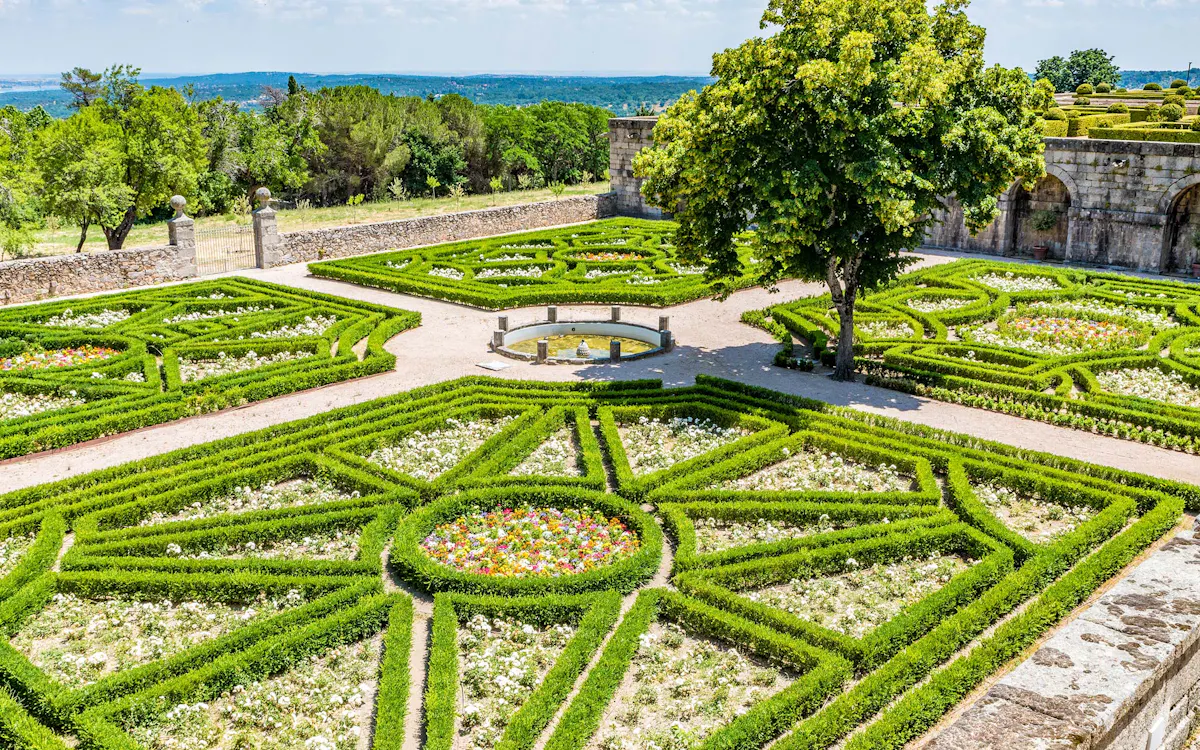
5The Basilica
The Basilica of San Lorenzo de El Escorial is a striking building located in the town of El Escorial, just outside of Madrid, Spain. Built in the 16th century, the basilica is one of the country's best-known examples of Renaissance architecture. The exterior of the building is characterized by its grand scale and simple, symmetrical design. The interior, meanwhile, is elaborately decorated with marble walls, carved woodwork, and stained glass windows. The basilica also houses the remains of several Spanish royals, including King Philip II.
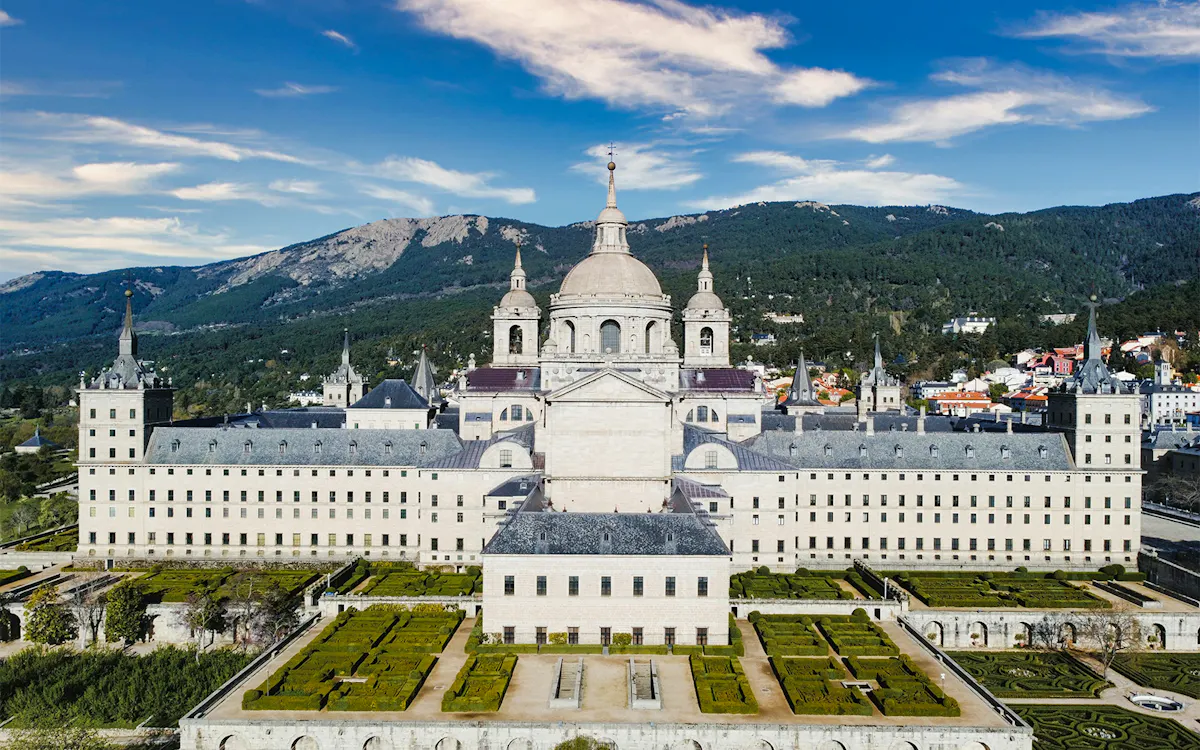
Map of El Escorial
5 Facts you probably didn't know about El Escorial
- Juan Bautista de Toledo, one of the architects of El Escorial had previously renovated the great St. Peter’s in the Vatican, which is why you can find some of the basilica’s design elements replicated in the Palace.
- The complex was known as the '8th Wonder of the World' during the late 16th century due to its magnificent features.
- The complex has approximately 4,000 rooms, a total of 2,675 windows and more than 1,200 doors.
- Legend tells us that the door to Hell was sealed off beneath the Basilica by Philip II.
- The library has books on various subjects including Dark Science and Esotericism.
Accessibility at El Escorial
- Wheelchairs are available at site.
- Though El Escorial is not fully wheelchair inclusive, around 90% are accessible (including the museums, main cloister and the Palace of the Habsburgs).
- The Battle Gallery, the Palace of the Bourbons and the Royal Library, all located in the second floor are accessible by a hydraulic lift.
- The main entrance to the Basilica and the Monastery has ramps for better accessibility
- The outdoor spaces are accessible, but the uneven cobblestones in the pavements may make the ride umcomfortable.
- Wheelchair accessible washrooms are available.
- Audio guides are not available. Download the ‘Monastery of El Escorial’ IOS or Andriod app before hand for more information.
Insider tips
- El Escorial is always cold, being amidst the mountains. Be sure to get dressed in warm layers.
- Try to visit early on weekdays to avoid the crowd.
- Photography is prohibited in much of El Escorial. Flash photography is prohibited in all areas.
- Wear comfortable footwear, as the walks around can be long.
- Large bags are not allowed inside El Escorial. Free lockers are provided for your bags. Though secure, it is advised to not leave your valuables behind.
- Download the ‘Monastery of El Escorial’ IOS or Andriod app on your device to make the trip more enriching with their guide available in 16 languages.
- If you have plans to stroll around the town before or after your visiting El Escorial, remember that 'Siesta' or afternoon nap is a thing here and there are chances of shops closing in the late afternoon.
Things to do around El Escorial
FAQs
Tickets start at €12, book your tickets directly through Headout to skip the lines and enjoy a seamless experience.
The best time to visit El Escorial is from September to November, with fewer crowds and pleasant weather.
Ideally, it should take three to four hours to walk around comfortably.
The museum opens at 10 am.
Yes, you can pick up souvenirs and more at the gift shop inside.
Other top experiences in Madrid
Madrid has tons of other attractions you can visit after your El Escorial trip. Here are some other attractions that are now open to the public that cannot be missed! Check out more things to do in Madrid.
More...







